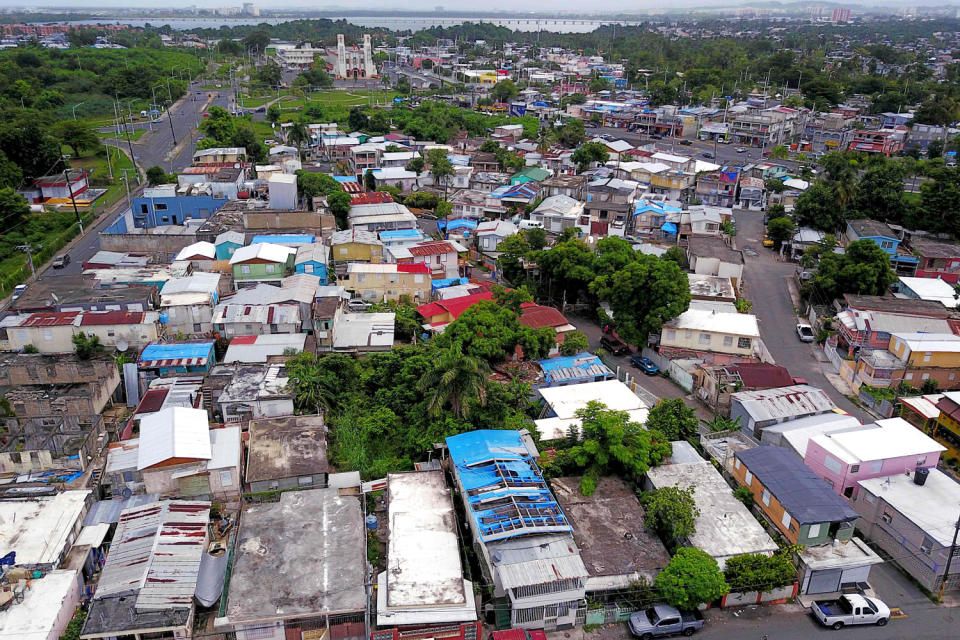On Hurricane Maria anniversary, Puerto Rican groups push Congress on tax breaks, food security
WASHINGTON — Traditional Puerto Rican "bomba y plena" will be echoing across the U.S. Capitol on Wednesday as activists and elected officials from the island prepare for congressional meetings to advocate for food security and an end to controversial tax breaks that give wealthy investors incentives to partly relocate to Puerto Rico.
The rally, dubbed a "plenazo," was coordinated by Power 4 Puerto Rico, a coalition composed of mostly stateside organizations advocating for Puerto Ricans on the island.
Under the banner of “Reclaim our Land,” advocates from more than 10 states and Puerto Rico are coming together Wednesday to support policy changes on the island and commemorate the sixth anniversary of the devastating Hurricane Maria that killed more than 3,000 people.

According to the groups, hurricanes Maria and Fiona and the Covid pandemic made clear how Puerto Rico's overreliance on food imports — 85% of what's consumed on the island is imported — left families vulnerable as supplies dwindled when shipments couldn't reach the U.S. territory.
Congress is considering a farm bill that would set the legal framework for agricultural and food policy in the United States and its territories for the next five years.
Puerto Rican farmers and their allies are pushing for the territory to transition to the Supplemental Nutrition Assistance Program, also known as SNAP or food stamps, which is used in the 50 states.
Currently, the Puerto Rico Nutrition Assistance Program is funded through block grants that can't be readjusted after they’ve been approved, even if there's increased need after a natural disaster like a hurricane.
This leaves the food assistance program that benefits almost half (46%) of the island’s population facing funding cliffs almost every year, putting the local government in the tough position of either keeping all enrollees in the program and cutting back their benefits or reducing the number of enrollees in order to keep current benefit rates.
Advocates are also looking to include a legislative proposal that would maximize nutritional assistance funds by allocating half of all federal funds granted to Puerto Rico through the U.S. Agriculture Department to support farmers through a Puerto Rico Food Sovereignty Program administered in the U.S. territory, according to the Puerto Rican Cultural Center, a Chicago-based advocacy group.
According to the group, the proposal has garnered the support of Rep. Delia Ramírez, D-Ill., 13 Puerto Rican mayors and the University of Puerto Rico's Agricultural Science College, as well as elected officials in several states and Puerto Rico's Sustainable Agriculture Community Land Trust.
Groups are also calling for an end to tax incentives under Act 60, designed to attract wealthy investors from outside the island, as well as corporations that could export goods and services.
One of the taxes provides qualifying businesses, foreign or local, that have an office in Puerto Rico a 4% fixed income tax rate for exporting services.
The other more controversial tax break allows individual investors who haven't lived on the island between 2006 and 2012 to get a zero percent tax rate on capital gains if they purchase a residence and live there at least half of the year.
The government has defended its modest economic impact, saying it has generated more than 30,000 new jobs, while opponents say the “predatory tax evasion” has hurt Puerto Rico, as well as mainland states, and has raised real estate prices on the island.
"While Puerto Ricans are losing their homes and communities, the U.S. Treasury, states and local governments are losing much needed tax revenues to fund essential services," said Federico de Jesús of Power4Puerto Rico and director of the video project Losing Puerto Rico, which calls for the end of such incentives.
The project released a new video Wednesday ahead of the "plenazo" rally.
“The right course of action is for Congress to stop this unfair tax haven that is allowing tax evaders to cheat and displace us from our own communities,” Sandra Cruz García, general coordinator of VAMOS, an Puerto Rico-based grassroots organization working on displacement issues, said in a statement.
This article was originally published on NBCNews.com

